The Women on the Frontlines of the Los Angeles Wildfires
They are firefighters and aid workers, chefs and booksellers—and they’re all on a mission to show up for their community.
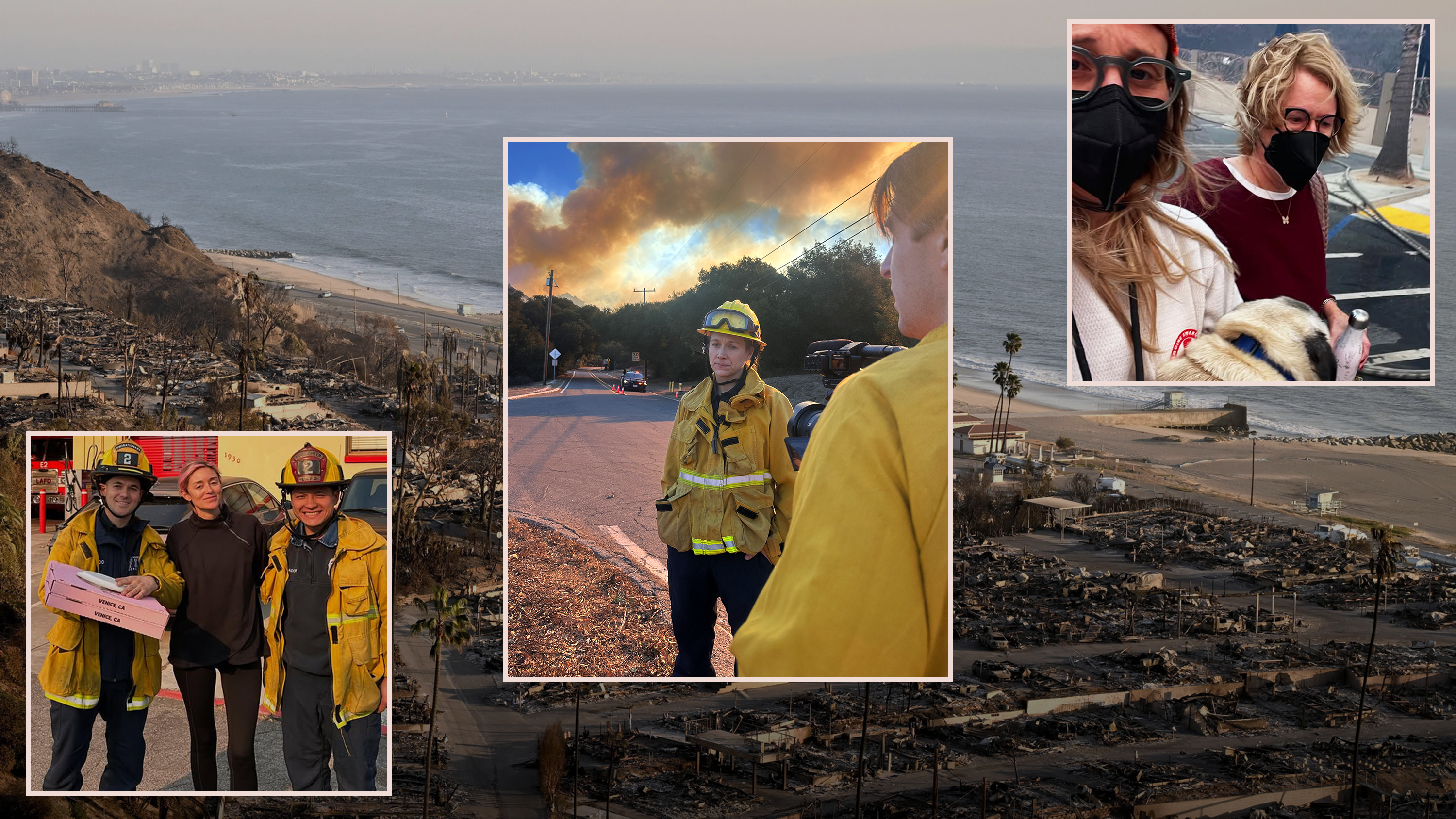
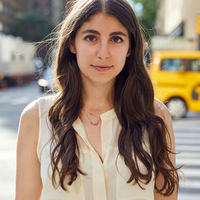
The Los Angeles wildfires have been burning for over a week, killing at least 25 people and burning nearly 40,000 acres. The two largest fires, the Palisades Fire and the Eaton Fire, razed entire neighborhoods in the Pacific Palisades and Altadena. Thousands of Angelinos are displaced as they manage the aftermath of losing their homes and businesses.
But in the past week, as desperation and destruction gripped Southern California, everyday Angelinos, desperate to help, have stepped up to help their community.
We spoke with people working tirelessly across Los Angeles, organizing spreadsheets of aid, rescuing pets from burned-out structures, feeding weary fighters, and treating patients dealing with respiratory issues, to learn more about the work they’re doing—and what comes next.

The firefighter helping people understand what’s happening on the frontlines
Lyndsey Lantz, firefighter and public information officer with LAFD
I got called in on Tuesday. I live up in Lake Arrowhead, and I just drove down. It was crazy trying to get to our incident command post. It was like every canyon on the way over here was on fire. I had fire on both sides of my car. We don't feel helpless as firefighters very often, but I was in my personal vehicle. Just trying to get here was something that's going to stick in my mind.
That first day, we set up our original command center at Will Rogers State Beach in Santa Monica. That whole cliff side was on fire. All the trailers were full of smoke and ash. It was pretty gnarly that first night. We were just trying to get our arms around the incident.
Some of us are living dual lives. The heartbreak and grief of our personal lives are wrapped up and put aside for the time that we're here and having to be professionals.
Lyndsey Lantz
As a public information officer, I work with a team that assembles as much correct and releasable information as we can, keeping the media and residents informed on everything from evacuation orders to progress on the fire, acreage, containment, and new hazards. Now, we’re starting to shift into our repopulation phase, which will involve getting people back to their homes if they're standing or getting them in there to assess the damage and recover any property they can and start the rebuilding process.
Stay In The Know
Get exclusive access to fashion and beauty trends, hot-off-the-press celebrity news, and more.
For the first 24 hours, our boots on the ground were doing their best to get people out and to protect life. The reality was those winds were moving the fire so quickly that you almost could have thrown infinite numbers of people and fire apparatus at the fire and it still wouldn't have gone out. It was just moving too fast.
This is an unprecedented incident. No two ways about it. I've been a firefighter with LAFD for six years. No one's seen anything like this in their careers and some of them have 35-year long-careers. It's just huge.
I have three friends so far that I know have lost their homes in the Eaton Fire. Some of us are living dual lives. The heartbreak and grief of our personal lives are wrapped up and put aside for the time that we're here and having to be professionals on the incidents that caused those personal griefs.
That's really a silver lining in something like this. You feel the humanity.
Lyndsey Lantz
The Palisades is absolutely ravaged. It almost doesn't even look like fire. It looks more like bombs went off or there was some sort of attack, like those pictures of neighborhoods in World War II. Just swaths of blocks leveled.
There's some consolation that in the middle of all of this tragedy and terror, we can know that we're being a tiny piece of the help. When I've been out on engines in fires like this, like the Getty Fire or the Saddle Ridge Fire, you really have blinders on. Maybe you're saving this home and the one next to it, or you're waiting for the fire to come up this slope so you can put it out before it gets to somebody's home. It's such a micro view of what's going on and it's hard work and it's very immediate.
The citizens have been so generous. We've had lots of donations and people want to help. We have people coming in from all across the state. We have firefighters from Mexico, from other states. It's just incredible the amount of generosity that we've been shown. That's really a silver lining in something like this. You feel the humanity. We all have these soft underbellies and as hard as you have to be in something like this, the connection and gratitude is huge.
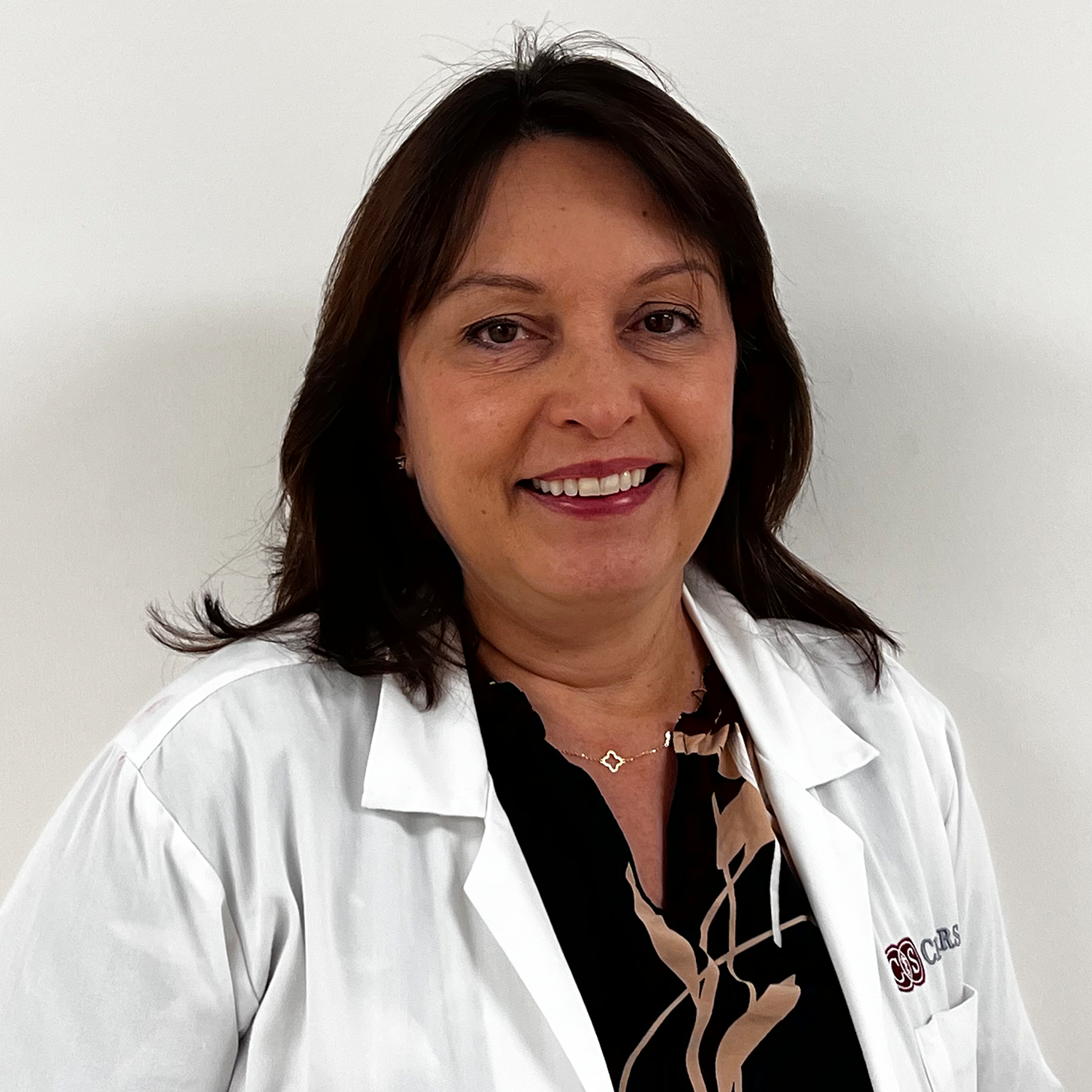
The pulmonologist treating an uptick in respiratory issues
Dr. Isabel Pedraza, a pulmonologist and director of the Intensive Care Unit at Cedars-Sinai Medical Center, where she also runs an asthma clinic
I was working when all this happened, and it was shocking how quickly everything escalated. We have a lot of physicians and staff members at Cedars-Sinai that lived in the Palisades that ended up losing their homes in the fire.
The Sunset Fire in Hollywood was very close to my house. When it broke out on Wednesday, I was in the supermarket with my daughter with no reception. When I got out, I had about 40 messages. Everybody was calling me, asking me what I was doing. We had to evacuate too, and then I had to work over the weekend.
Cedars-Sinai is in the center of Los Angeles. We are midway between both the Eaton Fire and the Palisades fire. At my asthma clinic, people are coming in with worsening shortness of breath, nasal congestion, lots of coughing, lots of phlegm production, what you would expect from airway irritants and an increased concentration of them in the air. I'm actually having that myself. That’s been bad for me as well.
I've had a handful of patients contact me that they had to go to urgent care because of worsening asthma. A few of them needed to be put on steroids. The numbers are increasing in terms of people in the intensive care unit and people in the hospital. I would have to imagine that part of that is due to what I would assume to be inflammatory effects of wildfire because even if you wear N-95 masks, the air quality everywhere is poor.
At my asthma clinic, people are coming in with worsening shortness of breath, nasal congestion, lots of coughing…
Dr. Isabel Pedraza
As doctors, we all have to be able to manage our emotions to some extent or we couldn't do our jobs. In some ways it’s similar to COVID. But the difference now is, because of where we are, the devastation is so much more…I don't want to say personal, but so many of our colleagues’ lives have been completely changed because they've lost everything. People are covering their shifts or finding ways to allow them to deal with this trauma without having to worry about working.
It is unsettling to have that happen in the background, but it did feel very similar to COVID in that it could affect you and that you were trying to help people who were being affected by it as well. You have to put your own personal stress on the shelf.
I’ve been in Los Angeles since 2001. These fires are very sobering. I don't think anyone thought that kind of devastation could be possible, that entire neighborhoods could be wiped out. I live not too far from the Sunset Fire. It’s suburban, but still surrounded by Griffith Park, which is a large wooded area. It has made me think twice. Are we prepared? Is our home prepared for something like this?
The writers who started a viral list of GoFundMe campaigns for Black communities
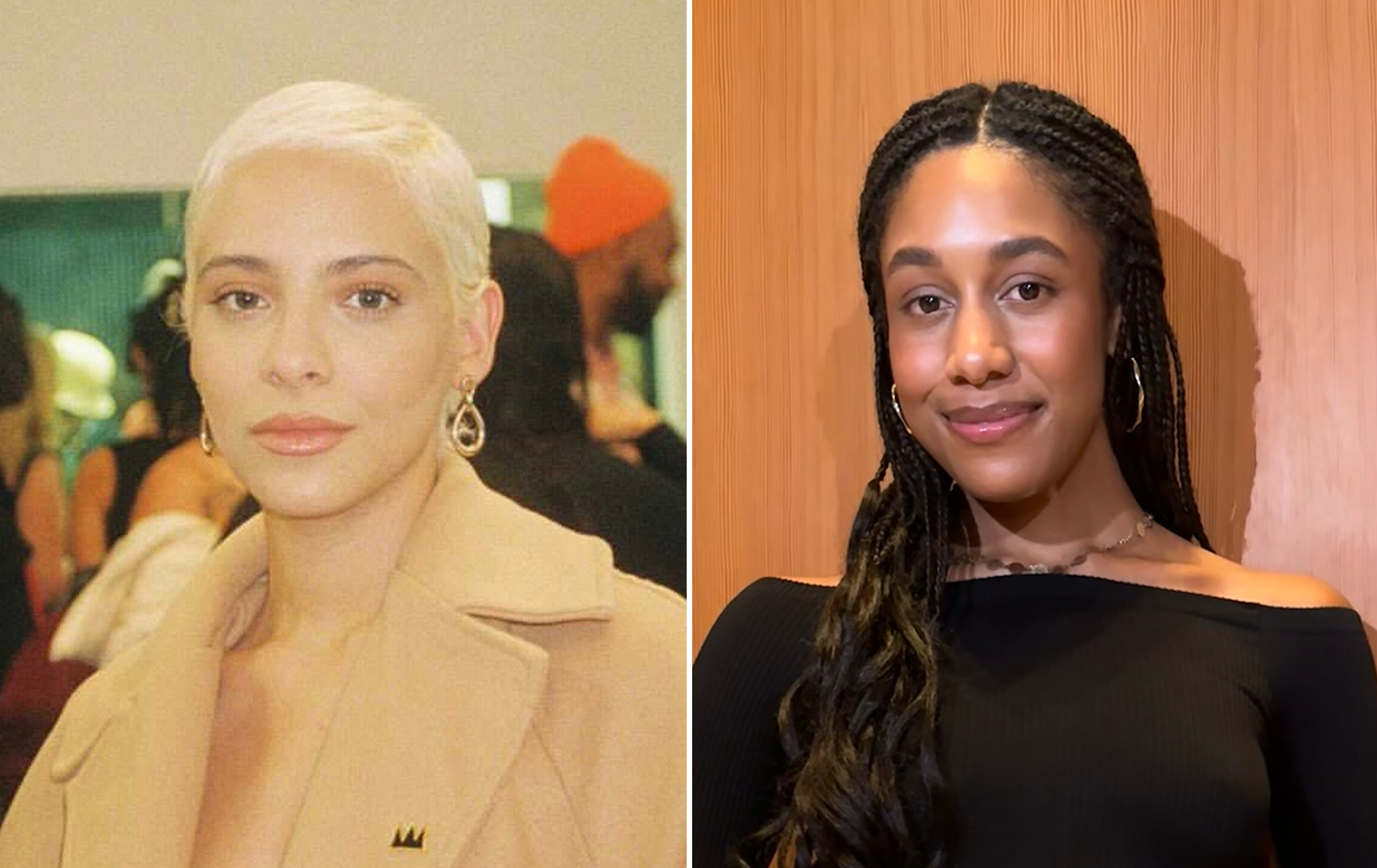
Leslie Vargas (left) and Cierra Black (right)
Cierra Black, contributing writer at AFROPUNK; Leslie Vargas, writer and social lead at AFROPUNK
We started by posting individual Black families' GoFundMe campaigns on our own stories. It was important for us to uplift this community, specifically due to the history of the Black community of this land, as many Black Pasadena and Altadena natives have been calling attention to. From conversations in the DM, we decided to consolidate and put all campaigns we were seeing onto a Google Sheet. Leslie then created a social graphic and started to amplify the list via the AFROPUNK social channels. From there the requests kept growing and the list continued to make its rounds.
As the list kept getting amplified across the internet, we came into contact with other people who were working on their own organizing efforts such as WalkGood LA, which opened up their physical space to facilitate donations, pickups, and deliveries for affected families. There were countless groups of people who all pulled together to amplify each others’ efforts across media channels and work together in-person as a community to support each other in this time of need.
It was important for us to uplift [the Black] community, specifically due to the history of the Black community of this land…
Cierra Black and Leslie Vargas
When we initially began posting on AFROPUNK, it started to gain traction and we received inquiries from community members interested in supporting the efforts. Once we reached around 200 families on the sheet and more submissions on our social platforms, we connected with others (now centralized through the Community Aid Dena collective) to help populate the list as the submissions rolled in. So many of the submissions came from people trying to support their loved ones or campaigns they came across, so this was really a huge collective response and effort.
Families found the list to be a trusted and effective source to amplify their campaigns and therefore continued to circulate the list as well amongst their own networks.
Having centralized lists is important because they provide an accessible source for those seeking to donate and add their fundraising efforts in one shareable place. Giving people one call to action where they can have access to a vast well of information in one place can be more effective than sending people to multiple separate sources.
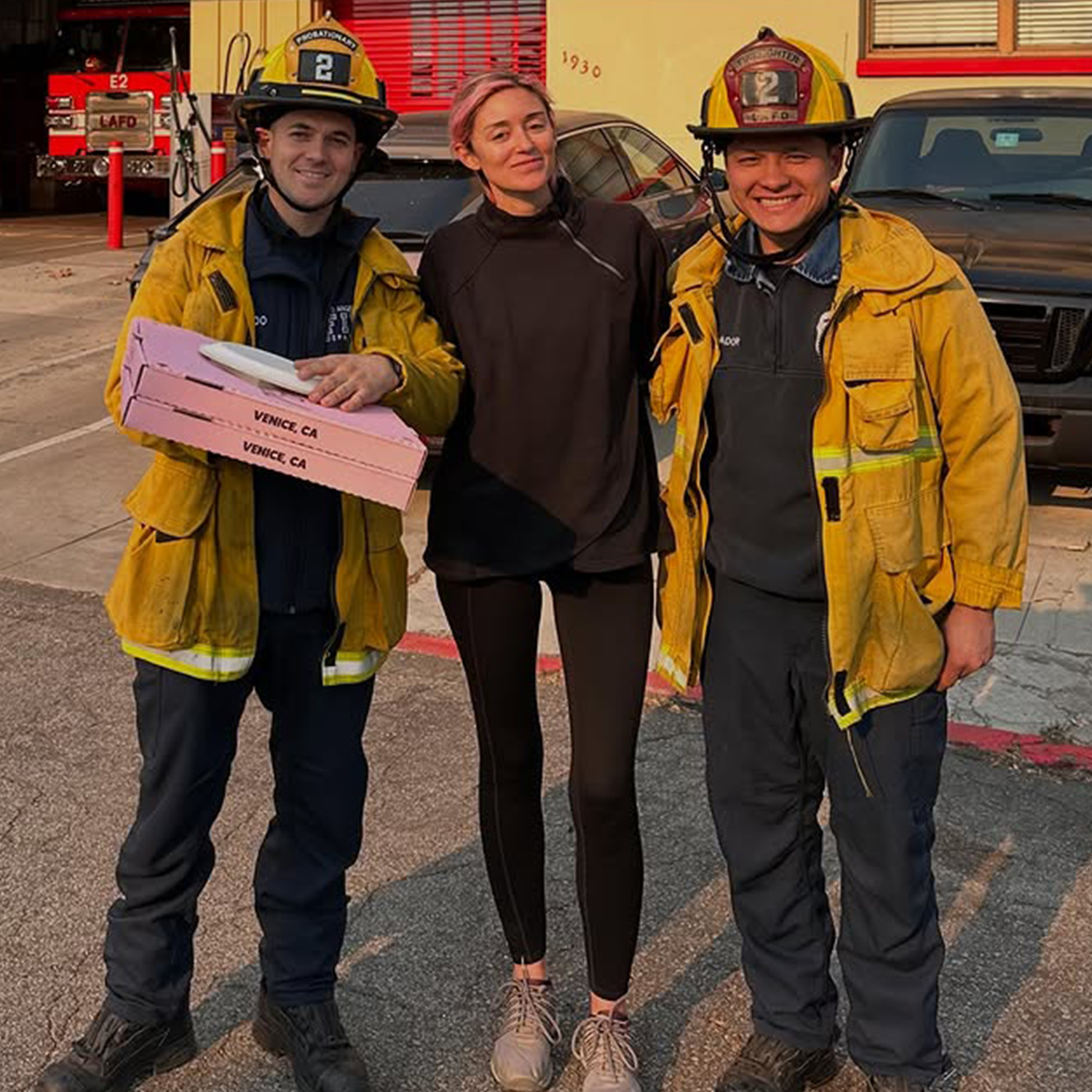
The chef delivering food to firefighters
Caroline D’Amore, founder of Pizza Girl
I was sitting in my house in Topanga Canyon having a Zoom meeting, and all of a sudden I heard about 30 fire trucks go by and a helicopter over my head. My phone was vibrating with evacuation warnings. Then I got news that the house I grew up in—my dad's house in Malibu— was completely gone.
It's just shocking. Overnight your entire life can change. I remember not knowing where to go, what to do. I came to my pizza shop. I said to my brother, my staff, “No pressure, no one has to work, but I know that people need to eat. Anyone who wants to come is welcome.” Everybody kind of just rolled up their sleeves and came in. We just started making pizzas.
The first thing I did was post on my Instagram stories that I was going to be feeding anyone on the frontline. One of the firefighters had already followed me and came by and I fed him and his crew. They told me where to go if I wanted to keep feeding people. I just loaded up the Pizza Girl van with as many pizzas and drinks as I could.
We drove into the frontline, down the California Incline. By the time I got there, the firefighters were so tired, covered in soot, and just so grateful. I was in tears. I posted that moment and it went extremely viral. What that did was make our phones ring off the hook with people wanting to help. I kept loading up my van and going in with what people were dropping off—donations, drinks, snacks, anything I could.
You show up, no questions asked, I’m going to feed you…I’m just helping as many people as I possibly can while me and five people are in a hotel room.
Caroline D’Amore
People are buying pizzas for firefighters, which is really cool. I spoke to one of the firefighters last night and he was like, “Now we're overwhelmed. We have so much food, we have so much stuff. Thank you so much.”
We are now trying to put together an organization because this is not a three-day thing. Homes are destroyed. The media and all the silliness like—these are rich people and famous people—has taken away from all the people that are really not rich and famous and are struggling.
This mom that I knew ran up to my restaurant recently, shaking in tears, doesn't know what to do. I just packed her a huge bag of stuff. Just now when I didn't answer your call, I was feeding an evacuee and her daughter. People know that they can come to Pizza Girl and they'll be fed for the unforeseeable future for free. You show up, no questions asked, I'm going to feed you.
A lot of restaurants are opening their doors for anyone who needs a meal right now. It's what we should be doing. The service industry makes me feel like I'm part of a really beautiful community. I don't have a plan. I'm just helping as many people as I possibly can while me and five people are in a hotel room.
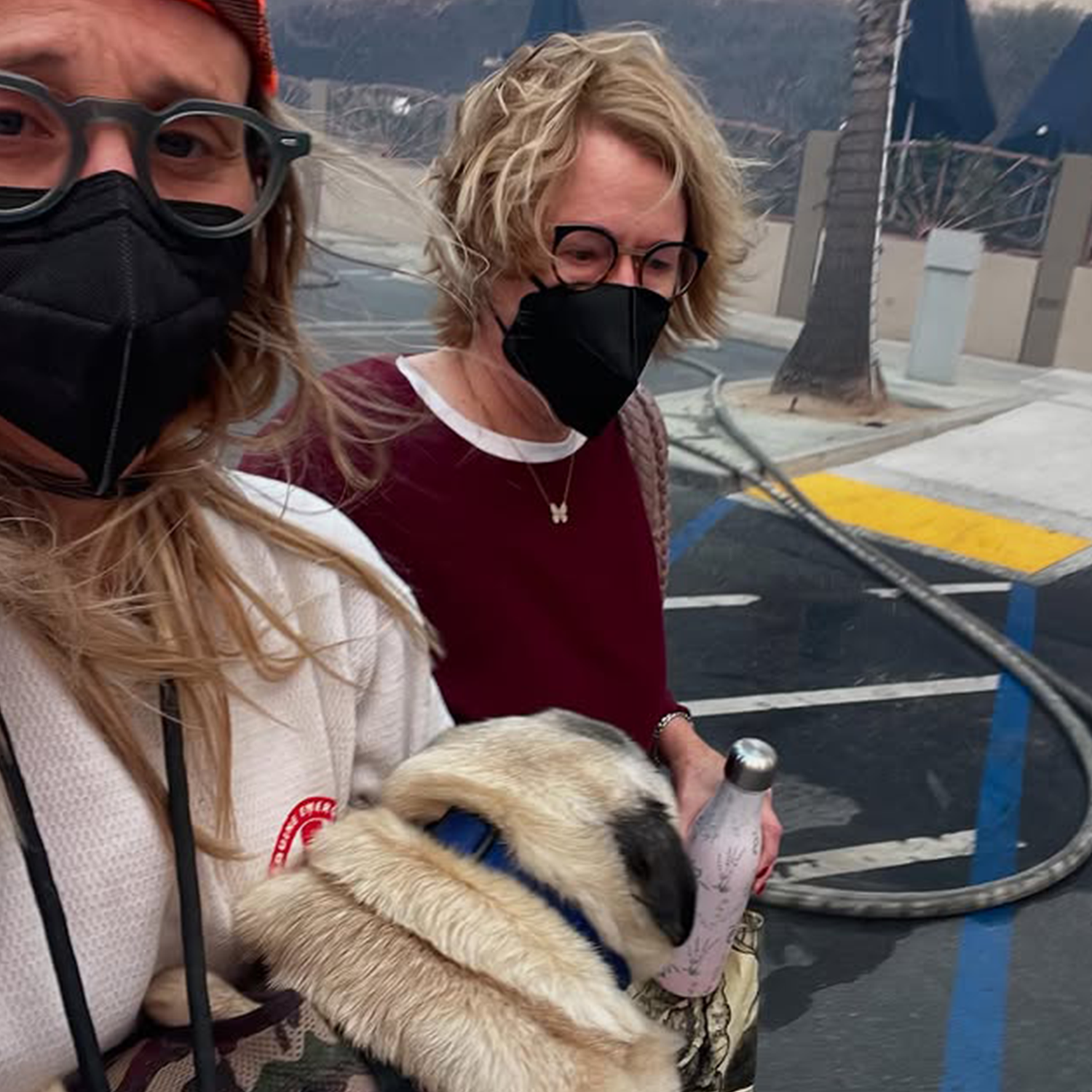
Mel Sobolewski (left) with a woman and her dog, both of which Sobolewski helped rescue.
The emergency responder rescuing pets from the rubble
Mel Sobolewski, certified animal responder
I started going into the fire when it broke out on Tuesday, and a lot of that was helping people and animals evacuate. I was able to help kids, dogs, elderly people. The rest of the week has been responding to house calls, doing a lot of search and rescue. Sadly, a lot of it has been a lot of search, not so much rescue. Now I'm into the second phase where the dust is settling, where I am able to go into homes and get some animals that have survived. I’ve responded to hundreds of calls. My work is free. I would never charge anyone for any of these rescues.
I am completely certified with FEMA for large animal rescue in terms of first aid, CPR. I was responding to a home where there were two turtles. It was presumed that all the koi fish were dead. I go into this house. The whole house is gone. I'm able to locate the pond and I started searching for the turtles, and I realized that there were koi fish still alive. I've never even owned a fish, but my thought process there was, If this animal is alive, I don't care what I have to do. I'm going to give them a fighting chance to stay alive. I improvised. I had my cat's litter box in the car. So I just started filling the fish that were alive into the cat's litter box, and then I took my cat's carrier case and I started putting the turtles in there.
The fire doesn't care how much money you have. The fire doesn't care who you voted for. The fire doesn't care about your race or anything. The fire doesn't care.
Mel Sobolewski
Ever since then, I have been getting so many calls about fish. Those two fish are still alive and doing really well. They are real fighters. All of these animals matter and they're all going through the same levels of stress. They all just experienced a massive trauma to their system, and they all deserve to get out and recover. They were all very much loved. Every single owner very much loves their hamsters, their turtles, their pets. Just because the animal's smaller, it doesn't reduce the level of love or importance.
I want to make this super clear: The only homes I enter and the only homes I go onto their property are the homes that I have permission to enter from the owner. A lot of the homes that have been burned are really difficult because basically I'm lifting rubble and wreckage and trying to find any sign of life that includes remains.
Going into homes where there's been damage, I try to use as much sensitivity. These people are not going to be able to get back home for a minute, and even if they are able to go back home, they may not be able to live there. There's an extreme amount of sensitivity. There's smoke, there's damage, and there's memories lost. There's pictures of families; there's so much love. When I'm in that moment, I try to slow down and find the life, find the animals, and be very thorough in that process and get out.
The fire doesn't care how much money you have. The fire doesn't care who you voted for. The fire doesn't care about your race or anything. The fire doesn't care. And just because you live in a wealthy neighborhood doesn't mean you're immune to this.
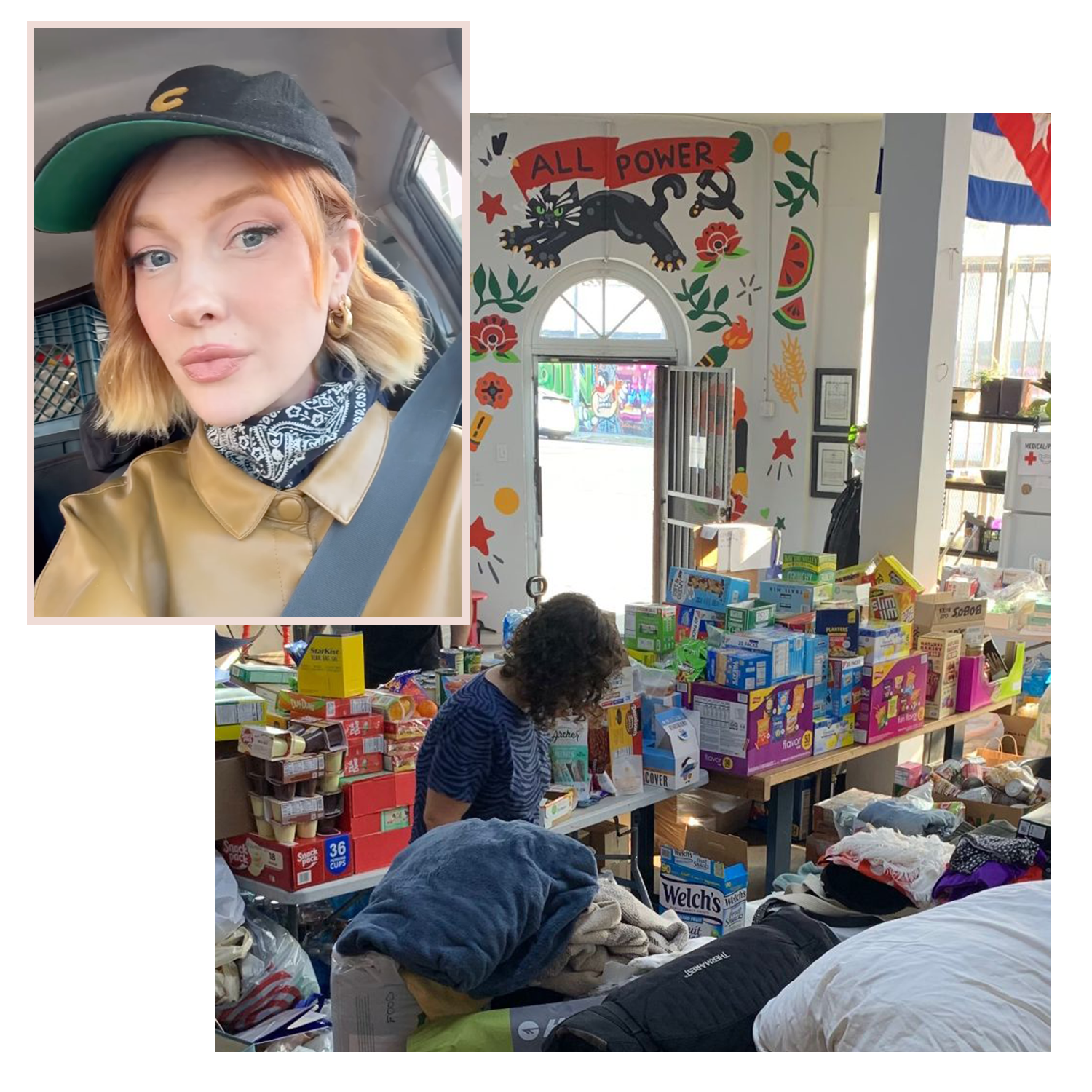
The bookseller organizing mutual aid distributions
Savannah Boyd, co-founder, co-organizer, and political education chair of All Power Books
We are completely run by volunteers. No one takes a single penny of profit. We provide direct material aid to the people of Los Angeles in the form of free grocery distributions, and we have a free store within our space that has access to household supplies and medical supplies, and food pantry items. We also run All-Power clinic, which is a group of volunteer nurses, doctors, and healthcare workers that create mobile pop-up clinics and go around and service different neighborhoods in Los Angeles.
So as soon as the fires started, we made the decision we were going to use our storefront as a depot to be able to accept donations. We, along with a bunch of other mutual aid organizations that are completely decentralized and are run by regular working class people, have, through networking and through years of work, developed this kind of underground network through Signal chats and Discord.
Our goal is to help people and to fill in the gaps that the government isn't.
Savannah Boyd
We would hit the chats and be like, “The Pasadena Community Center is asking for blankets and water and masks.” We would put a call out and we'd get a ton of blankets and masks and water, and we'd set it aside and then we would have somebody coordinate drop off there. We even had people going away from the fires to go to MacArthur Park and to hand out masks and tarps and water to our unhoused neighbors and people who don't have access to air filters and things like that.
The second day we were a little more organized. Most of the things that were needed were K-N95 masks, water, food, batteries, and portable chargers. We got a huge donation of Pressed Juicery juices that we were handing out.
It's been pretty crazy. A lot of our members have been in safe zones, but my partner and I actually had to evacuate during the Sunset Fire. We’re okay and were able to go home. But ultimately, we know what the goal is. We know we have a vision in mind. Our goal is to help people and to fill in the gaps that the government isn't. The main emotions that all of us are feeling are disbelief and anger because the government response to all of this has been at best, woefully neglectful.
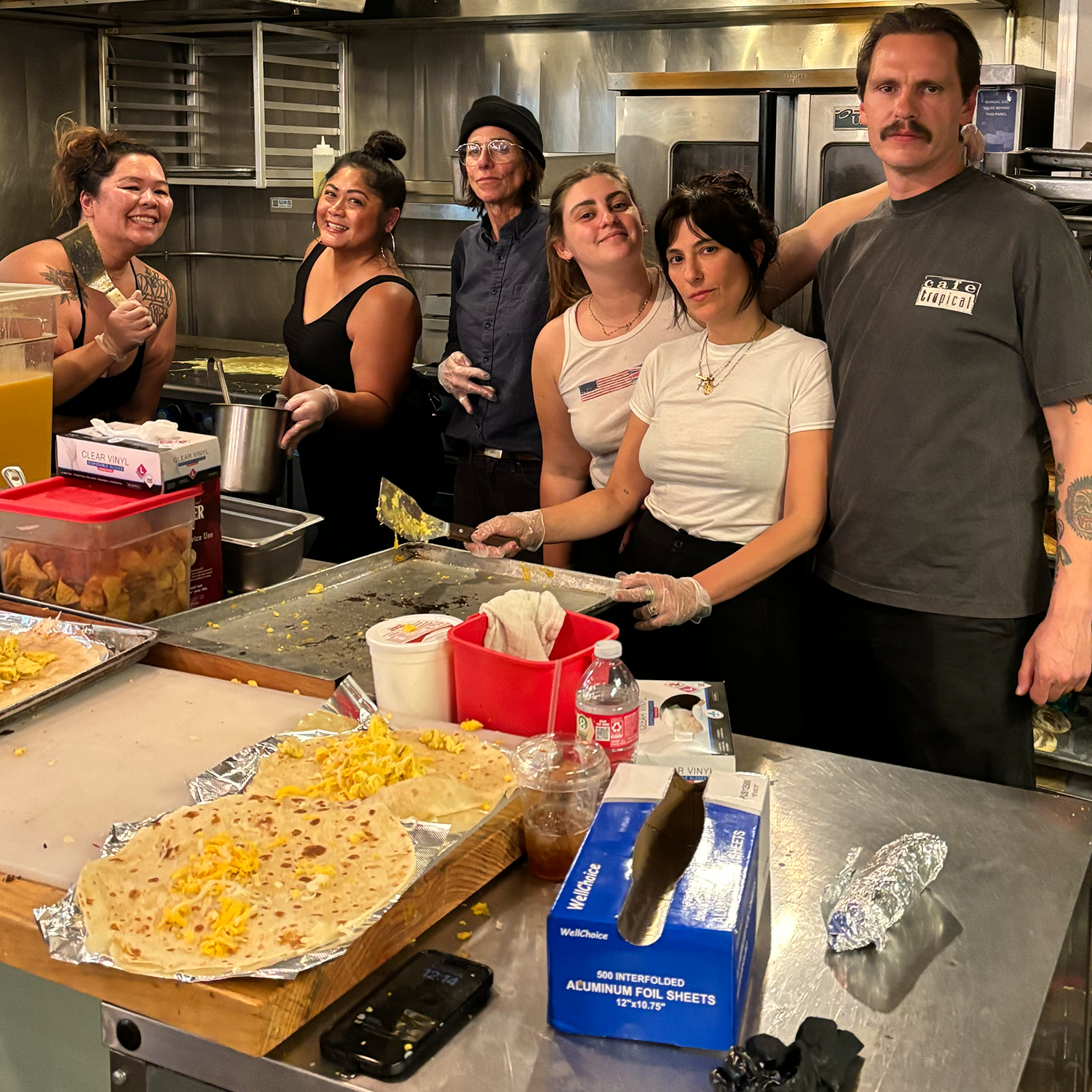
Esmé Edwards (third from right) and the Feed the Streets LA team.
The nonprofit worker offering hot meals to anyone in need
Esmé Edwards, executive director of Feed the Streets LA
I am parked outside the Pasadena Convention Center right now. All of LA is responding. Tragically, everyone knows someone who's lost a home, been displaced, trying to figure out how to move through life right now.
We were doing this during Covid and the Black Lives Matter protests; we were giving out masks and food. So we are used to this and we operate all year round. We give out meals five or four days a week right now to people living on the streets, so we are using our same model and applying it to this situation because we're looking at people that are displaced and needing support.
Giving someone a meal is about nourishing their body and nourishing their heart and letting them know that someone's there and looking out for them.
Esmé Edwards
Food is so central to life and how we can feel good and feel nourished. Giving someone a meal is about nourishing their body and nourishing their heart and letting them know that someone's there and looking out for them. To be able to give people three meals a day and meals that are cooked or from Jon and Vinny's or Night+Market, people are able to feel that comfort in a time when there is so much discomfort and so much unknown.
LA is a place where everyone's like, Everyone just cares about who you know, and I'm like, I do care about who you know right now! You're connected to a restaurant or you are connected to a clothing company or a medical supply store? Who? How can we work together?
The disaster relief expert handing out supplies
Diane Valero, disaster preparedness coordinator for Healing Urban Barrios
As soon as we heard word about the fires, we went out passing N95 masks and water to the homeless that were in our area. Then we set up at the Glassell Park District Office. We have everything—emergency blankets for those who have lost power, flashlights, light sticks, and things of that nature. We started giving people information on how they can prepare themselves; how to use a fire extinguisher, things like that.
I realized that so many people were impacted due to the power outages, even though they weren't displaced by fire. They were coming in to get information and get free supplies that they weren't prepared for. We went to the local hardware stores and big name brand stores to try to stock up but as soon as we got there in the morning, they were out of everything. People were panicking. There were no more flashlights, there were no more goggles or air filters for their house. So the supplies that we had were really useful. People were really thankful to be able to get just a flashlight.
[This couple] had left for vacation and came back to...nothing. Their entire house was burned down. They had the suitcase that they came on the plane with and that was it.
Diane Valero
We had this couple come in. They look well dressed. They were well spoken, and they were coming in trying to get some stuff. They had left for vacation and came back to no help, like zero, nothing. Their whole entire house was burned down. They had the suitcase that they came on the plane with and that was it.
There were people staying in their cars, full families living in their cars, and then they still had to take whatever they could, so they had their cars filled with their belongings. I saw people literally sitting on the sidewalk crying, praying. We have four people on the disaster team and we spent the entire day there. You almost didn't want to go home, you just had to because it was so exhausting.
Jessica Goodman is the New York Times bestselling author of The Counselors, They'll Never Catch Us, and They Wish They Were Us. She is the former op-ed editor at Cosmopolitan magazine, and was part of the 2017 team that won a National Magazine Award in personal service. She has also held editorial positions at Entertainment Weekly and HuffPost, and her work has been published in outlets like Glamour, Condé Nast Traveler, Elle, and Marie Claire.
-
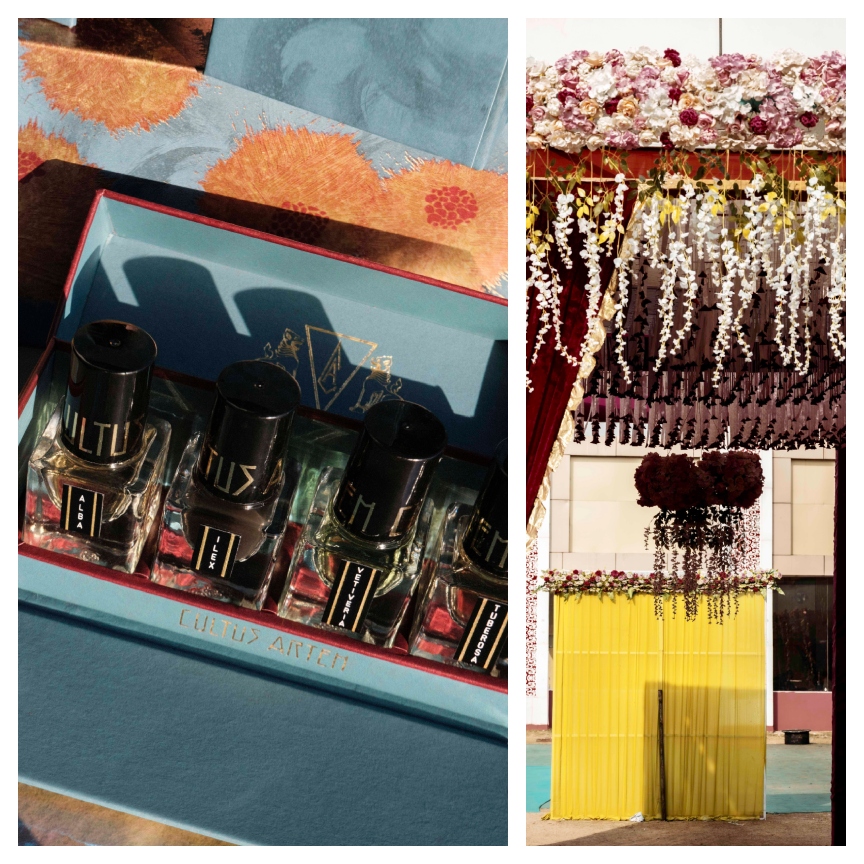 Slow Fragrance Is Reimagining the Future of Sustainable Perfume
Slow Fragrance Is Reimagining the Future of Sustainable PerfumeWhile the rest of the beauty world is speeding up, ultra-indie perfumers are deliberately slowing down—way down.
-
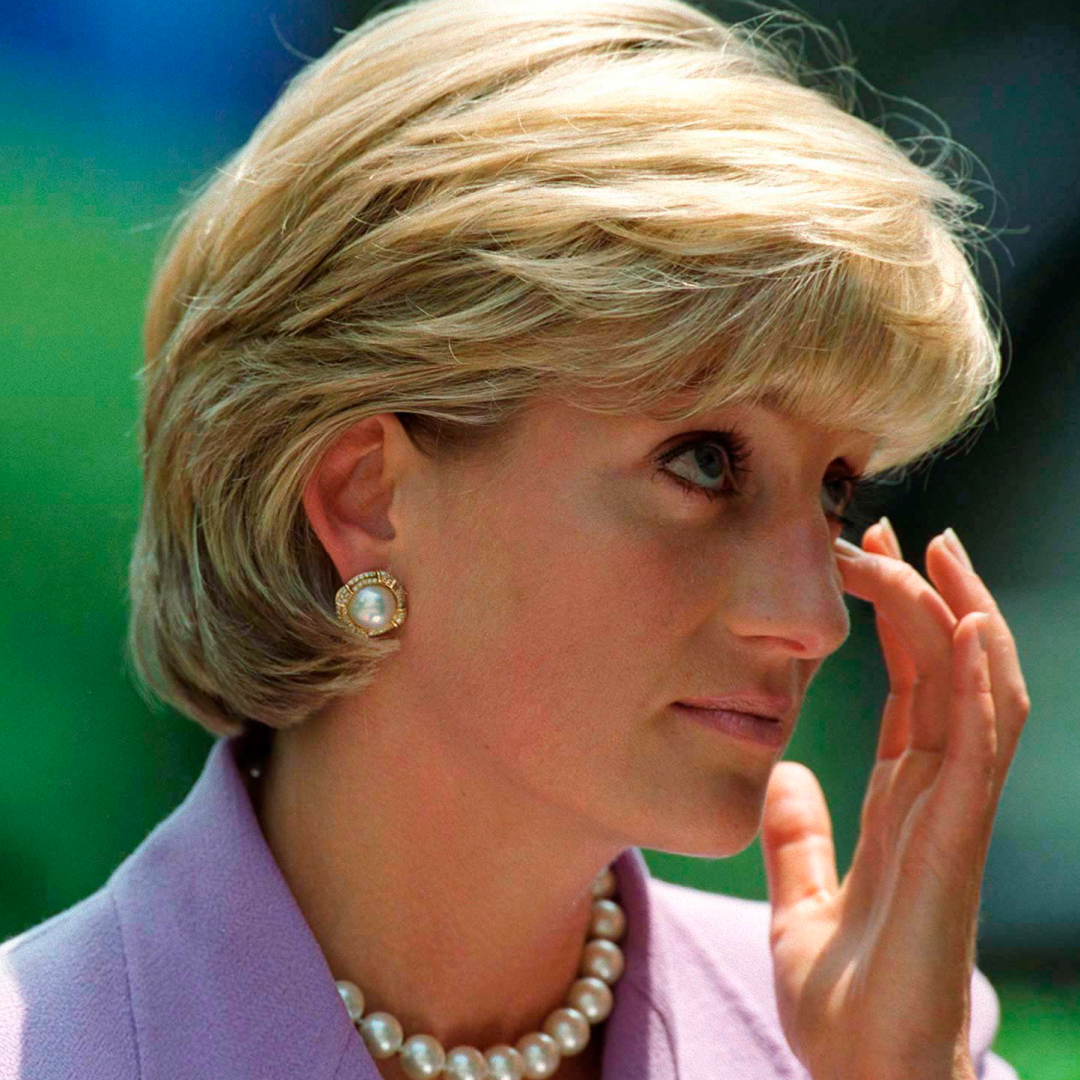 Princess Diana "Started Crying" While Discussing Shocking Event
Princess Diana "Started Crying" While Discussing Shocking EventNews presenter Eamonn Holmes recalled a moment when the late princess "went into a whole literal sob story."
-
 Sydney Sweeney's Blowout Gives Va-Va-Voom Volume and Major Bounce
Sydney Sweeney's Blowout Gives Va-Va-Voom Volume and Major BounceI'm ready for a summer of '90s hair.